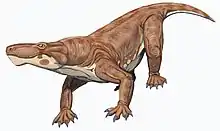Yikezhaogia
Yikezhaogia is an extinct genus of therocephalian therapsids from the Early Triassic of Mongolia.[1] It is known from a single fragmentary skull and associated postcranial bones representing the species Yikezhaogia megafenestrala. It is identifiable as a therocephalian by its thin postorbital bar behind the eye socket, its elongated temporal opening behind the bar, and a thin lower jaw with a low coronoid process. Large tooth sockets in the upper jaw indicate that Yikezhaogia had large caniniform teeth. The teeth of the lower jaw are blunt-tipped and cylindrical.[2] Although its exact position among therocephalians is uncertain, Yikezhaogia is probably a basal member of the group Baurioidea.[1]
| Yikezhaogia Temporal range: Early Triassic | |
|---|---|
| Scientific classification | |
| Kingdom: | Animalia |
| Phylum: | Chordata |
| Clade: | Therapsida |
| Suborder: | †Therocephalia |
| Superfamily: | †Baurioidea |
| Genus: | †Yikezhaogia Li, 1984 |
| Type species | |
| †Yikezhaogia megafenestrala Li, 1984 | |
References
- Abdala, F.; Rubidge, B. S.; Van Den Heever, J. (2008). "The Oldest Therocephalians (Therapsida, Eutheriodontia) and the Early Diversification of Therapsida". Palaeontology. 51 (4): 1011. doi:10.1111/j.1475-4983.2008.00784.x.
- Sun, A. (1991). "A review of Chinese therocephalian reptiles" (PDF). Vertebrata PalAsiatica. 29 (2): 85–94.
This article is issued from Wikipedia. The text is licensed under Creative Commons - Attribution - Sharealike. Additional terms may apply for the media files.



